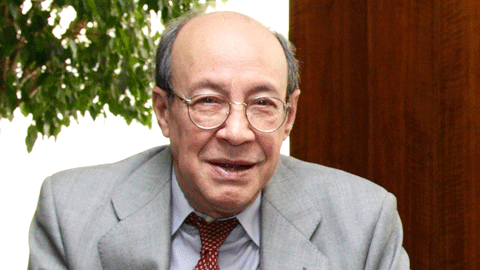In memory of Professor Francisco Rico
The UAB is sad to announce the passing of Professor Francisco Rico, who taught Medieval Spanish Literature at the UAB and was an academic member of the Royal Spanish Academy. The UAB, the Faculty of Arts & Humanities, and the Department of Spanish wish to extend their most heartfelt condolences to all those who knew and appreciated him, and express their sorrow for his passing.

Our beloved Professor Francisco Rico has passed away. Professor in Medieval Spanish Literature at the UAB since 1972, he was one of the last great teachers of all philologists of the past fifty years and a relevant figure in the humanities, both in Spain and internationally, whose teaching enriched our Department of Spanish. Fundamentally a philologist and literary historian - and always an excellent writer as well - he worked as such with a degree of accuracy and originality that made him a model for scholars of all humanistic disciplines. He worked especially on the Latin and Romance literature of the Middle Ages, Renaissance humanism, the novel, theatre and poetry of the Spanish Golden Age, and the history of ideas; but his three great centres of attention and where his work was most fruitful were Petrarch, Don Quixote and ecdotics.
His rich and varied intellectual work ranged from strictly textual and philological works to philosophical and historical studies. With equal eagerness, preparation and originality he confronted Latin and neo-Latin, Spanish, Italian, French and Catalan works. This mastery of literature, history and culture led him, eventually, to cultivate a kind of comparatism enriched by his enormous documentation, original and outside the schools in use. This independence of criteria allowed him to write insightful and suggestive interpretations of works of art from all periods, because he was characterised by an uncommon ability to appreciate the continuation and coincidence of cultural traditions; to find echoes and antecedents, critically framed; to trace the history of a substantially unitary culture, but chronologically, linguistically and spatially articulated. His contribution to the field of the history of ideas, particularly focused on the emergence of humanism in Spain, was of no less importance.
At the same time, he ensured that the results of specialised research were transferred with philological rigor and reached the general public in an accessible and profitable way, in the form of exquisite editions of Spanish classics from all periods. Thus was born and continues today what is considered to be the best collection of classics in the Spanish language: the Royal Spanish Academy's Biblioteca Clásica, which first appeared in 1993 as the Biblioteca Clásica of the Crítica publishing house in Barcelona. Three generations of university students and high school graduates have learned to enjoy the classics and modern literature through the 18 volumes of its Historia y crítica de la literatura española (History and Criticism of Spanish Literature).
He received many well-deserved honours, which illustrate the prestige and active presence of Professor Francisco Rico had at local and international level: full member of the Spanish Royal Academy (1986), the British Academy (1992), the Accademia dei Lincei (2000), the Académia das Ciéncias de Lisboa (2000), the Accademia della Crusca (2003), the Académie des Inscriptions et Belles-Lettres (2006) and Commandeur dans l'Ordre des Palmes Académiques de France (2009). He was awarded an honorary doctorate by the Universities Federico II of Naples (1992), Bordeaux (1994), Valladolid (1996) and Bologna (2016). He received the Menéndez Pelayo International Prize (1998), the Province of Valladolid Prize (1998), the Distinction of the Government of Catalonia (2001), the Menéndez Pidal National Research Prize in Humanities (2005), and its equivalents in Italy (Natalino Sapegno, 2006, and De Sanctis, 2016) and in Mexico (Alfonso Reyes, 2013).
The Ínsula journal, the most widespread journal on Hispanism in the world, recently dedicated a monographic issue (coordinated by Gonzalo Pontón and Fernando Valls) in which his life trajectory and the significance of his contributions were mentioned.
The intelligence, kindness and intellectual generosity of Professor Rico have left a lasting impression on all of us, because he was also an endearing friend who transmitted a passion for study, with the rigour and precision he always applied and instilled in his students. May he rest in peace.
Guillermo Serés Guillén